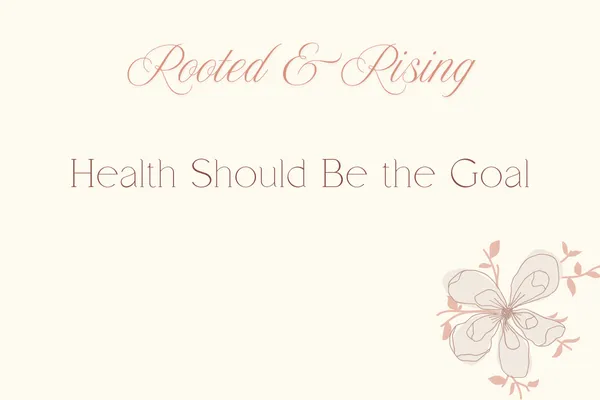
Health Should Be the Goal
Somewhere along the road of modern health advice, weight loss became a high-pressure, guilt-ridden project tied to numbers on a scale and the size of our jeans. And honestly? That frustrates me so much. We’ve been led to believe that the measurement of our thighs somehow matters more than the health of our hearts, our sleep, our joy, or our longevity. And in chasing thinness, many of us are actually compromising our health—stressing our bodies, disrupting our hormones, and even shortening our lifespans—all for the sake of fitting into a smaller size. So while yes, this is a conversation that includes weight loss, let me be very clear: your worth is not defined by a number, and weight is just one (very small) indicator of health. What truly matters is how well your body functions, how you feel in your skin, and whether you can live a full, energized, joyful life.
What if we aimed for health first, and trusted that weight loss might follow as a natural side effect? Turns out, when we stop obsessing over weight and instead support our bodies with real nourishment, movement, rest, and grace, things begin to shift—in more ways than one.
So, whether you're looking to lose a few pounds or simply feel better in your skin, here are the simple, sustainable foundations that support true wellness. Spoiler alert: no fad diets or punishments here.
Gut Health
Your gut isn't just about digestion; it's basically mission control for your entire body. It helps regulate metabolism, produce vitamins, manage inflammation, and send "I'm full" signals to your brain. Supporting it starts with slow, mindful eating (yes, chewing 30 times is a thing), possibly adding digestive enzymes, drinking enough water (half your body weight in ounces), and feeding your gut's good bacteria with fiber, probiotics, and prebiotics. Cravings and bloating often improve when your microbiome is happy. Who knew?
Exercise (That You Actually Enjoy)
You don’t need to run marathons or hit the gym like a 20-year-old bodybuilder. What your body craves is joyful movement: dancing, gardening, pickleball, walking, yoga, stretching—even breathwork exercises that activate your diaphragm and lymphatic system. My rule? If you dread it, you won’t do it. So choose something that feels good and keep it doable. Start with 10-minute walks or light strength training. Movement boosts metabolism, lifts mood, and surprisingly, helps reduce sugar cravings. Bonus: it makes you feel like you again.
Stress (The energy thief that you can't see)
Stress doesn't just make you tired and cranky—it literally tells your body to store fat. When cortisol is dysregulated from stress, your body craves sugar and salty snacks, digestion slows down, and sleep gets interrupted. Translation: we eat more, digest less, and feel too drained to care. The fix? Breathwork, nature walks (yes, trees have calming powers), mindfulness, journaling, and even symbolic acts like writing down your stress and tearing it up. Stress happens, but we don’t have to let it run the show.
Hormones (The Unsung Heroes or Villains)
Hormones like insulin, estrogen, leptin, and ghrelin all play a role in weight and how we feel. If they’re out of balance, your best efforts might feel like pushing a boulder uphill. Support them by focusing on quality sleep, consistent meals with protein and fiber, strength training, and stress reduction (there it is again!). Our bodies are constantly communicating with us—especially when they feel off-balance. Gentle shifts in food, rest, and movement can bring surprising harmony.
Toxins (The Stuff You Didn't Know Was Sabotaging You)
From plastics and candles to food additives and cosmetics, we’re constantly surrounded by hormone-disrupting chemicals that can throw a wrench in your weight and health. Supporting your body’s detox systems means more than a trendy juice cleanse—it means real food, lots of leafy greens, hydration, and moving your body. Sleep is your brain’s detox time, so guard it like the precious resource it is.
Mindful + Emotional Eating
Most of us don't overeat because we're physically hungry. We eat because we’re bored, tired, sad, anxious, or just out of habit. Learning the difference between physical and emotional hunger is huge. Are you hungry for food, or for comfort, connection, or calm? Craving patterns also often reflect nutritional gaps (hello, magnesium and dark chocolate), and how mindfulness, journaling, and curiosity (not judgment) can help you shift old habits.
So what does it all boil down to?
Your body is wise. It has reasons for its cravings, its fatigue, and even its extra weight. It’s not working against you—it might just be trying to protect you or call for help. When we shift from punishment to nourishment, from shame to curiosity, weight loss stops being a battlefield and becomes a byproduct of healing.
If anything here spoke to you, start with one small thing. Chew slower. Take a walk. Add some fermented food to your plate. Go to bed 30 minutes earlier. It doesn’t need to be dramatic. The wins are in the quiet, consistent steps.
And remember, you are already worthy. Whether the scale moves or not, supporting your health will never be a waste of time. Let’s focus on that.
